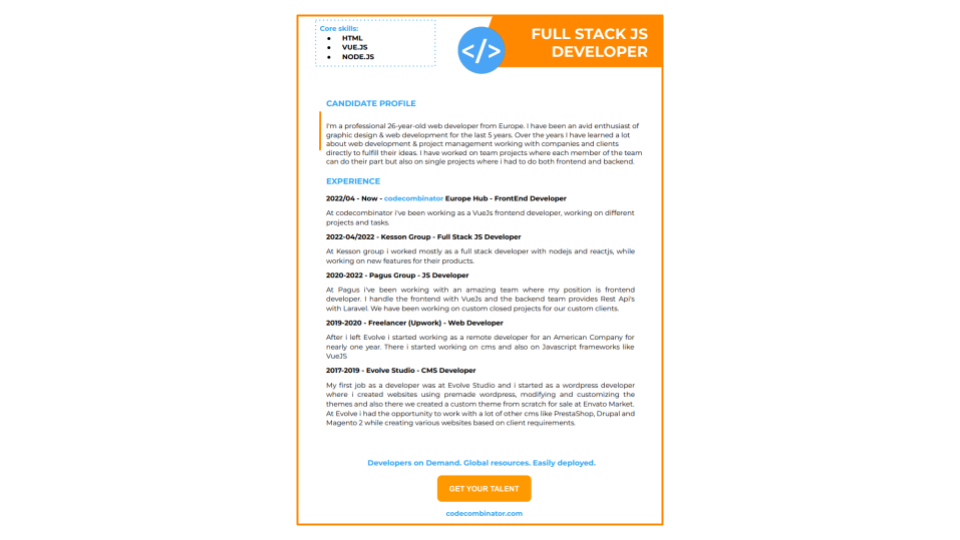Simple Definition of JavaScript
What is JavaScript? It is a type of scripting language that is used to create dynamic content for web pages. By incorporating interactive features such as dropdown menus, animated graphics, and dynamic background colors, JavaScript enhances the user experience for visitors of a website.
So, to put it simply JavaScript is a still popular, lightweight programming language that is widely used by web developers to create dynamic interactions for web pages, applications, servers, and even games.
JavaScript rarely comes alone
In web development, JavaScript is commonly used in conjunction with HTML and CSS. It complements CSS by allowing for user interaction, which CSS cannot accomplish on its own, while also helping to format HTML elements.
The versatility of JavaScript is evident in its application across web, mobile, and game development.
But let’s start from the beginning…
Initially, JavaScript was developed solely for internal use. However, after Netscape submitted it to ECMA International as a standard specification for web browsers, it became the foundation for the release of ECMAScript.
Designed as a general-purpose scripting language, JavaScript aimed to ensure that web pages could be compatible with various browsers and devices. After a while, JavaScript has continued to evolve in tandem with new browsers such as Mozilla Firefox and Google Chrome. Google Chrome, in particular, introduced the first modern JavaScript engine, V8, which compiles bytecode into native machine code.
Today
Today, JavaScript is supported by numerous frameworks and libraries, including AngularJS, jQuery, and ReactJS, that make it easier to manage complex projects.
At first, JavaScript was used exclusively on the client-side, but with the development of Node.js – a cross-platform server environment based on the Google Chrome JavaScript V8 engine – JavaScript has expanded to the server-side.
While JavaScript programming is primarily used in web-based applications, it has also found utility in other fields. Below are some of the current fundamental uses of JavaScript.
Building web servers and server applications
- JavaScript, through the use of Node.js, enables developers to create web servers and backend infrastructure, ultimately saving time and effort in the development process.
Web and mobile applications
- With the help of JavaScript frameworks, which comprise pre-written JavaScript code libraries, developers integrate ready-made features into their projects. This saves them time and effort that would otherwise be spent coding such features from scratch.
- jQuery or ReactJS are frameworks that improve design efficiency for developers. These frameworks also enable developers to reuse and update code components without impacting each other in terms of function or value.
Dynamic web pages
- The core of JavaScript is its ability to make web pages dynamic. This includes a number of features such as displaying animations, changing the visibility of text, and creating drop-down menus.
More on the topic: click here
Which type of JavaScript Developer do you need?
Front-end
A front-end developer designs and builds websites and applications using web technologies such as HTML, CSS, DOM, and JavaScript. These creations can run on the Open Web Platform or serve as input for non-web platform environments such as React Native.
A skilled front-end JavaScript developer possesses knowledge in the design aspects of an application, particularly in creating the user-interface. If your team already has a back-end engineer, it’s recommended to concentrate on finding a front-end JavaScript developer. They must comprehend user experience, design principles, and possess the capability to transform mock-ups into functional interfaces.
A front-end JavaScript Developer should:
- Understand user experience
- Pay attention to design principles
- Have the ability to translate prototypes into functional interfaces
Back-end
The task of constructing the app’s database architecture falls upon the back-end JavaScript developer, who is also responsible for the server-side functionality. To streamline your hiring process, it’s recommended to hire a back-end developer if you already have a front-end JavaScript developer. The ideal candidate for a back-end developer should possess a strong proficiency in Node.js, expertise in developing APIs, and the ability to connect data to the front end.
A back-end JavaScript Developer should:
- Have a very good knowledge of Node.js
- Have expertise in API development
- Own the capability to link data to the frontend
Full-stack
A full-stack JavaScript developer possesses a diverse skill set and can proficiently develop both the back-end and front-end of an application. They are capable of creating the architecture of the application and designing its user interface. If you are commencing a project from scratch and do not intend to hire specialized developers for the front or back end of your application, it is recommended that you consider hiring a full-stack JavaScript developer. These developers should have a broad understanding of database architecture and design requirements, but may not have extensive expertise in either field.
A full-stack JavaScript Developer should:
- Be able to combine his skills from both areas (API’s, databases, landing, web & mobile)
- Have a deep understanding of database architecture (MEAN & MERN)
- Have a broad understanding of design requirements
What to consider when hiring a Javascript Developer
Skills of JavaScript Developers
Since it is impossible to precisely describe the skills required for each JavaScript developer profile, we summarize the most important competencies here.
We will start with the
Technical Skills
- Proficiency in HTML, CSS, and JavaScript at an advanced level
- Capability in crafting bespoke solutions using JavaScript libraries and frameworks
- Acquaintance with intricate data structures and algorithms
- Competence in designing and executing intricate software architecture
- Aptitude for producing efficient, scalable, and maintainable code
- Mastery of web development tools and workflows, including CI/CD
- Robust problem-solving skills and ability to diagnose intricate problems
but also be sure to pay attention to the
Soft Skills
- Self organizational skills as well as management skills if needed
- Reliability in order to meet deadlines and deliverables
And if you plan to hire remotely:
-
Communication skills
Remote developers need to be able to clearly and effectively communicate their ideas, questions, and concerns to colleagues, clients, and managers through written and verbal communication channels.
-
Time management skills
Remote JavaScript developers must be able to prioritize tasks, set realistic deadlines, and manage their workload to ensure they meet project deadlines.
-
Adaptability
Long distance work can be unpredictable and presents challenges such as technical difficulties or lack of face-to-face interaction.
-
Collaborative mindset
Even though remote work is often individual-focused, developers must be able to work collaboratively with other team members.
-
Self-motivation
Working remotely requires self-discipline and motivation. Developers need to be able to motivate themselves and stay focused on tasks to ensure they are meeting deadlines and producing quality work.
-
Conflict resolution skills
Be sure to prevent misunderstandings and conflicts. Embedded team members should be able to handle conflicts and disagreements professionally and be willing to listen to feedback from others. They’re part of your team, let’s treat them like that.
Also settle on the right choice of project management for you.
Do’s and Don’ts of hiring a JavaScript Developer
Do’s
Search for a JavaScript developer with a strong portfolio
One of the most important things to consider when hiring a JavaScript developer is their portfolio. A portfolio tells you about the technology stack each candidate has used in previous projects.
Look for experience
Look for a JavaScript developer who has experience with the specific tools and frameworks you use, and who has experience developing applications similar to the ones your company has.
Test skills
Conduct technical interviews and code reviews or request work samples to assess the developer’s skills and problem-solving abilities.
|💡How to use the current Crises as an Opportunity for your Startup Growth
Don’ts
Don’t just rely on academic credentials
While a degree in computer science or similar can be helpful, it’s not always an accurate indicator of a developer’s skills or ability to work in a team.
Don’t neglect soft skills
Like we mentioned before, technical skills are important, but soft skills like teamwork, communication, and problem-solving skills are just as critical to a successful hire.
Don’t rush the process
Take your time to find the right person for your team. A rushed hiring process can lead to a bad hire that will cost you more time and resources in the long run. If you do not find the best fit right away, you can always work together with a professional partner company, which has access to a pool of talented developers.
Hiring freelance JavaScript developers could be a quick solution to the staff shortage. In the long run, however, this is not always the case, as freelancers in particular are known for “project hopping”.
|💡Check Out: Our In-Depth Guide on How to hire Remote Developers
Salaries of JavaScript Developers
According to glassdoor, the estimated average salary for a JavaScript developer in the United States is $95,962 per year. This is closely related to the different skill levels of your next JavaScript developer. So make sure you know which skill level is essential for your project.
More on the topic of the different skill levels of developers can be found here.
When you hire JavaScript developers from the codecombinator ecosphere, you can save valuable resources, because we charge up to 40% less than the comparable domestic talent.
|💡The Right Guide for your Software Development Project in 2023
✅ See what your possible JavaScript Developer from the codecombinator ecosphere looks like
Summary
To find the right JavaScript developer, you need to identify the specific type of developer you need and use an effective hiring and evaluation process. This saves time and ensures that you find the perfect fit for your team. Follow the do’s and don’ts we’ve discussed to assess your candidates thoroughly and confidently make the right choices at each step.
If you need help with finding the best fit for your tech team, you can reach out to codecombinator at any time. We as a professional partner in the field of tech talent placement have a worldwide network of developer hubs and are therefore flexible able to provide you with your preferred developer in a short time.
Team codecombinator
|💡Get Your latest Key Insights From Our Tech Blog

